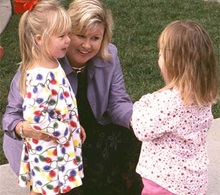 Whether you have a shy child or outgoing one, it can be challenging for children to make new friends and navigate social situations on their own. Though it’s not a good idea to manage every aspect of your children’s friendships or even bribe their peers to play with them, parents can provide opportunities and gentle coaching towards helping children make friends.
Whether you have a shy child or outgoing one, it can be challenging for children to make new friends and navigate social situations on their own. Though it’s not a good idea to manage every aspect of your children’s friendships or even bribe their peers to play with them, parents can provide opportunities and gentle coaching towards helping children make friends.
- Give children lots of opportunities to play with peers. Arrange playdates for preschoolers and school age children. If your preschooler is not in child care, enroll him or her in a preschool or a playgroup that meets regularly. Go to the park or other places where your child will have a chance to meet peers under your supervision. There is no substitute for the experience children gain from interacting with peers. Children who have had many opportunities to play with peers from an early age are clearly at an advantage when they enter formal group settings such as child care or elementary school.
Playground play teaches children about partnership, teamwork, and fair play. It is through play that a child’s primitive understanding about “rules” is reinforced because most games and social situations have rules. While our home environments may be more forgiving and tolerant about bending the game rules, it is quickly apparent to children that their peers aren’t always as tolerant and forgiving. Michele Borba, EdD, summarizes the importance of social skills, “Friends play an enormous part in the development of children’s self-esteem. If we want our children to become their personal best, it’s essential to improve their ability to get along well with others.”
- Play with your child like a peer. Get on the floor and build with blocks or act out imaginary roles. For school age children, play an outdoor activity like basketball or soccer or grab a board game for fun inside. You will learn a lot about how your child plays when you play with him. Observational studies indicate that the parents of the most socially competent children laugh and smile often, avoid criticizing their child during play, are responsive to the child’s ideas, and aren’t too directive.
- Talk to your child about their friends. Ask your child about what happened in preschool or school. “Whom did you play with today?” “Why do you like playing with that friend?” Have your child tell you about interactions that upset him. “How did you feel when he took your shovel at the park?” “Why do you think he did that?” “What could you do next time to play together?” Or if it was your child who took the shovel, ask the same questions, but talk about other ways to express his feelings and wants.
- Make your conversations opportunities to solve problems together. Remember, these are conversations and not lectures. It makes sense that we want our children to learn from what we say, but sometimes we need to just listen to how they feel and then develop coping strategies together.
- Try not to interfere in your child’s play situations. Unless your child or the other children are in danger of getting hurt or the situation has escalated beyond their ability to work out the issues, let your child work out her own social challenges. Children can benefit from learning to compromise on their own in a safe, supervised setting.
Helping Children Navigate Social Situations
Despite our best efforts to teach them, our children may still need help learning to take turns or accepting the ideas of others. As eager as we may be for them to succeed, here are some suggestion from Richard Lavoie, author of Teacher’s Guide: Last One Picked…First One Picked On, when coaching our children about social situations.
- Encourage children to make friends with kids who are a year or two younger. Although the children are different ages, they may be at a similar developmental level. By befriending younger children, your child may enjoy a degree of status and acceptance that he does not experience among his peers.
- Give children the opportunity to opt out when they do not want to participate in large groups play activities.
- Avoid highly charged competitive situations for young children. Competitive sports or other activities are often a source of great anxiety and failure for children trying to make friends. Parents should focus on participation, enjoyment, contribution, and satisfaction in competitive activities.
- Listen to children as they share about difficulties during a social situation and discuss optional strategies without judgement or punishment.
Resources for Children Who Need More Help Making Friends
Some children are born needing more help in forming friendships. Shyness, empathy, and the ability to read social cues are traits heavily influenced by our genes. Some children are very shy and need more arranged opportunities and gentle encouragement. Some children have less empathy and have trouble understanding the feeling or behavior of others. They may not recognize social cues or have insight into their own behavior that turns off other children and need our help.
Conversations about real life help. Here are some children’s books about making friends.
- Making Friends: A Mister Rogers’ First Experience Book, written by Fred Rogers
- How Kids Make Friends: Secrets for Making Lots of Friends, No Matter How Shy You Are, written by Lonnie Michelle
We want our children’s lives to be happy, healthy and filled with good friends. Helping young children make friends and manage social interactions is a great way to prepare them for a life of navigating a social world.
For more information on childcare and parenting, check out Premier Academy’s Blog Page.


